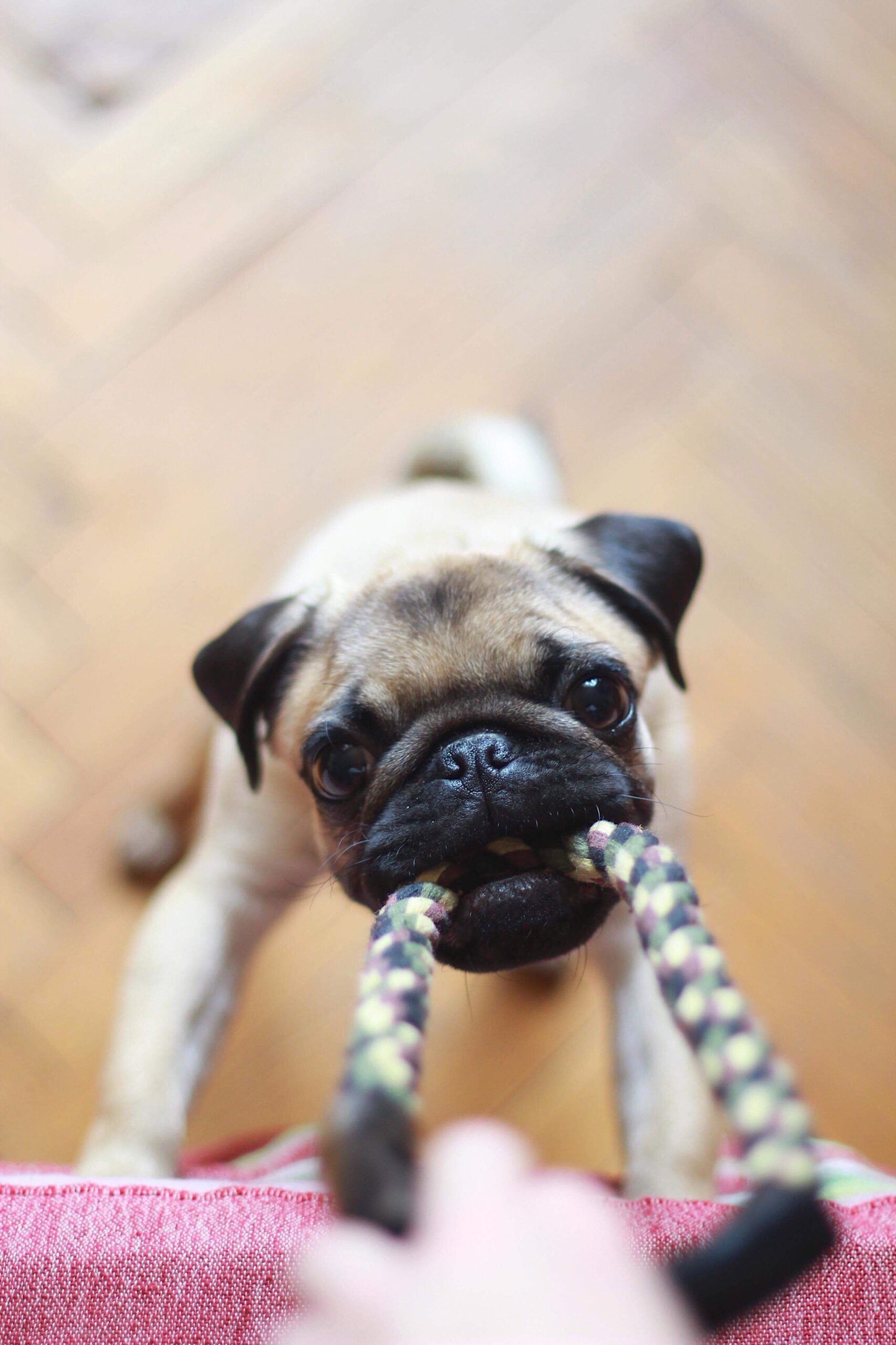Welcoming a new puppy into your home is an exciting journey filled with rewarding moments and inevitable challenges. One can easily get swept up in the joy of choosing a puppy without fully understanding the commitment it entails. Much like with human babies, puppies require constant attention, a structured feeding routine, adequate socialization, and careful grooming.
Your preparation and willingness to devote time for training and care would determine your puppy’s growth into a healthy and happy dog. That’s where understanding puppy care becomes significantly essential. This guide will help you navigate the early stages of pet ownership, focusing on different aspects, from nutrition and housebreaking to behavioral modifications and healthcare necessities.
How does one effectively raise a puppy? What are the need-to-knows about puppy vaccinations? How do we manage teething problems or difficult behaviors? What do puppies eat and how often? We’ll cover these questions and delve into the core steps required to navigate the thrilling yet challenging journey of puppy parenthood. Many first-time owners may feel overwhelmed, but with the right guide and tools, like our discussions at sweetdoggo.com, can ease that overwhelming feeling and turn it into a confident, knowledgeable experience.
Table of Contents
Preparing Your Home and Family for Your New Puppy

Photo by Zoritsa Valova on Unsplash
The first step in ensuring a smooth transition during a puppy adoption process involves preparation – of your home, yourself, and your family. Depending on the breed of your adorable puppy, you might need specialised equipment and facilities. For example, large breeds might require more space, while certain breeds require specific attention to temperature regulation.
As the saying goes, ‘A puppy-safe home is a happy home’. It’s crucial to puppy-proof your home adequately to keep your new addition safe. This involves removing toxic foods and plants from their reach, securing loose wires, covering up nooks where they could get stuck, and keeping delicate items out of harm’s way. Allocating a dedicated, comfortable space for your puppy can help them familiarize with the surroundings faster. Be sure to have puppy pads available in your home for the housebreaking journey.
Moreover, preparing your family involves informing everyone about the responsibilities, including feeding schedules, dog walking routines, and puppy training tips. Sharing these responsibilities can make the journey less daunting. It’s essential to ensure that everyone agrees on training methodologies to maintain consistency in the puppy’s learning process.
Lastly, make a checklist of the crucial items you might need initially, including bedding, food, toys, collar, leash, identification tag, and a puppy-proof fence if needed. It’s always a good idea to have these items ready before bringing your puppy home.
Choosing a Puppy and Integrating Them into Your Home
Embarking on the journey of bringing a new puppy into your home isn’t just a heartwarming adventure; it’s a commitment laced with joy, challenges, and responsibilities. Selecting the right breed and puppy is pivotal to this adventure. From the initial stages of understanding the gravity of dog ownership, prospective pet parents must dive deep into researching various breeds, pinpointing one that seamlessly fits their lifestyle, considering crucial factors like temperament, health predispositions, and activity needs.
Connecting to Online Platforms Can Be Beneficial in Making the Right Choice

Photo by Nick Morrison on Unsplash
Tools and online platforms offering genuine reviews, coupled with adorable puppy visuals, don’t just tug at your heartstrings; they’re instrumental in guiding you toward an informed decision, steering clear of unethical practices like puppy mills. Once you’ve selected your furry companion, the transition from choosing to bringing them home is pivotal. It’s not all cuddles and cute photos; it’s puppy-proofing your residence, investing in essentials that cater to their comfort and well-being, and preparing for the initial vet visits.
What to Do on the First Day
The first day is about more than survival—it sets the tone for your puppy’s sense of security and belonging. Introducing them to their new environment, other pets, and family members requires a blend of caution, excitement, and respect for their space, intertwined with establishing a solid routine—a structured blend of nourishment, play, and rest. But the responsibilities stretch beyond these initial stages. Early training and socialization efforts are the building blocks of your puppy’s character and behavioral traits. It’s about nurturing them with positive reinforcement, exposing them to diverse settings, individuals, and pets, and being vigilant about behavioral red flags, seeking professional guidance if necessary. The journey is a whirlwind of emotions, punctuated by challenges, learning, and immense growth for both the puppy and owner. Yet, at its core, it’s about creating a nurturing, stable haven, fostering a lifelong bond built on love, care, and mutual respect—a rewarding, shared experience begging to be voiced and passed on.
Understanding Puppy Behavior and Training Needs

Photo by Darinka Kievskaya on Unsplash
Puppies are naturally curious and playful, but there could be potential behavioral problems. Barking, nipping, chewing, and separation anxiety are few issues puppies may display. Instead of scolding or punishing, positive reinforcement training methods where good behavior is rewarded can help your puppy learn more effectively. It’s advisable to start training early on commands, social skills, and housebreaking.
Meeting Your Puppy’s Nutrition and Healthcare Needs
Puppy nutrition needs are unique and require balanced, ingredient-focused diet plans. Besides feeding, grooming plays a key role in puppy care. Regular brushing, bath, teeth cleaning, ear checks should be part of your puppy’s routine care.
Staying updated on puppy vaccination schedules and regular vet visits can ensure your puppy’s health. Watch for signs of sickness and behavior changes as these can be ways your puppy communicates discomfort.
Dealing with Puppy Teething and Chew Training
All puppies go through a teething phase which can be painful for them and destructive for your furniture. This can be managed with regular chew toys and following teething puppy tips available from trusted resources.
Understanding and Meeting Your Puppy’s Health and Nutritional Needs
One of the vital aspects of newborn puppy care revolves around catering to their health and nutritional needs. Puppies grow at an exponential rate and require a diet that matches that growth. It’s crucial to understand that puppy nutrition needs differ vastly from those of adult dogs. The diet should be rich in protein to support muscular development, fats for energy, and balanced amounts of vitamins and minerals for the overall health and wellbeing of your puppy.
Ideally, puppies should be fed 3 to 4 times a day. The portion size ultimately depends on the breed, age, and health of the puppy. Also, always ensure clean, fresh water is available to your puppy. Regularly monitoring their weight gain will help assess if their nutritional needs are adequately met.
Along with their diet, meeting your puppy’s health care needs is vital for its development. Regular visits to the vet should be part of your schedule. Keeping track of the puppy vaccination schedule will ensure your puppy is protected from fatal diseases. Regular health checks can help identify potential health issues early on, making them easier to manage or treat.
Common Health Problems in Puppies
Puppies, much like human babies, are prone to certain health issues in the early stages. Common health problems include fleas, worms, ear mites, and certain breed-specific genetic disorders. It’s important to get your puppy checked regularly to catch these issues early on. Backed by the right treatment and care, puppies can recover quickly and lead a healthy life.
Puppy Teething and Tips to Manage it
Teething is another integral part of a puppy’s growth process. During this phase, your puppy can exhibit a few behavioral problems like excessive chewing and biting. Understanding this as a natural process rather than a behavioral problem will help you manage it better. Employing teething puppy tips like providing safe chew toys can greatly ease this phase for both you and your puppy.
Puppy Grooming and Hygiene
Maintaining your puppy’s hygiene can definitely contribute to their overall health. Regular baths, coat brushing, teeth cleaning, and nail trimming are all part of a comprehensive puppy grooming guide. It’s necessary to use puppy-specific products for these grooming activities.
In conclusion, understanding and meeting your puppy’s health and nutritional needs can set the stage for their happy, healthy adulthood. Being proactive and consistent in this aspect can significantly enhance the quality of their life.
Training and Socializing Your Puppy: Key Principles and Practical Techniques
Training and socializing are significant elements of puppy care that contribute to the development of a well-behaved and well-adjusted dog. Housebreaking a puppy can be a challenge, but with a consistent schedule and ample rewards for doing the right thing, your puppy will soon learn.
Considering implementing puppy training tips into your daily routine can help manage potential behavioral problems. Training should start from day one and can begin with basic commands such as ‘sit’, ‘stay’, ‘come’. Remember, consistency, patience, and positive reinforcements are the pillars to effective training.
Housebreaking Your Puppy
One of the first and vital skills your puppy needs to learn is housebreaking. It’s an important task that requires time, patience, and consistency. Every time your puppy eats, plays, or wakes up from a nap, it’s a good idea to guide them to their ‘bathroom spot’. Providing praise and treats when they’ve done their business in the correct spot reinforces this behavior, helping them learn faster.

Photo by Gabrielle Henderson on Unsplash
Basic Training and Addressing Behavioral Problems
Basic training commands include ‘sit’, ‘stay’, ‘come’, and ‘heel’. These commands help in managing your puppy, especially when in danger. When trying to tackle puppy behavioral problems, try to understand the cause. By understanding your puppy better, you can tailor your training techniques to address their specific needs.
Socialization: Meeting Other Puppies and Humans
Similar to humans, puppies also benefit from socializing. Puppy socialization activities should include introducing them to a variety of individuals, other dogs, environments, and experiences. This will help them to grow into confident and friendly dogs. It’s essential to ensure that these experiences are positive for your puppy, further nurturing their development.
Advancing to More Complex Skills
Once your puppy has mastered the basics, you can progress to more advanced commands and tricks. This not only keeps them mentally engaged but also strengthens your bond with them. Training sessions should be kept short and rewarding, making it an enjoyable part of your puppy’s day.
Remember, puppies are unique, and what works for one might not work for the other. Adopting a flexible approach and providing a supportive learning environment will ensure your puppy grows into an obedient and sociable dog.
Celebrating and Navigating Your Journey as a New Puppy Owner
Becoming a new puppy parent is a rewarding journey that is filled with joy, laughter, and unquestionable love. Each adorable puppy breed brings its unique blend of charm, quirk, and companionship into its owner’s life. At the same time, choosing a puppy, housebreaking them, careful tending of their nutrition needs, and pointing out the right puppy behavioral trends are all part of a journey that can sometimes feel overwhelming. However, every high and low point will be equally rewarding when seen as an opportunity for growth for both you and your puppy.
Remember, the puppy stage does not last forever, and every phase has its challenges and enjoyments. Embrace every moment – the innocent blunders, the first successful “sit”, the struggle of teething, and the triumphant housebreaking. Each of these moments – captivating and testing, all roll into an experience of love and learning that would anchor you as a proud puppy parent.
Further Resources and Continued Learning in Puppy Care
The journey of puppy care does not simply end with their transition from pup to adult. As your bundle of joy grows and their needs evolve, the learning journey of you, the puppy parent, continues too. Whether it’s a deeper understanding of dietary transitions for your growing dog, behavioral changes to look out for, the delicate matter of aging dogs, every aspect of a dog’s life offers enriched learning opportunities.
Fortunately, there are plenty of resources out there, both online and offline, to support and guide you on this journey. From books to blogs, webinars to neighborhood dog clubs, expert advice to the organic, community-shared wisdom, the landscape of learning is widespread and diverse. Websites such as sweetdoggo.com offer one such helpful platform for puppy and dog owners alike.
As you navigate this winding road of puppy parenting, remember that every hurdle surmounted is a measure of the bond strengthened between you and your furry friend. Enjoy the journey!




